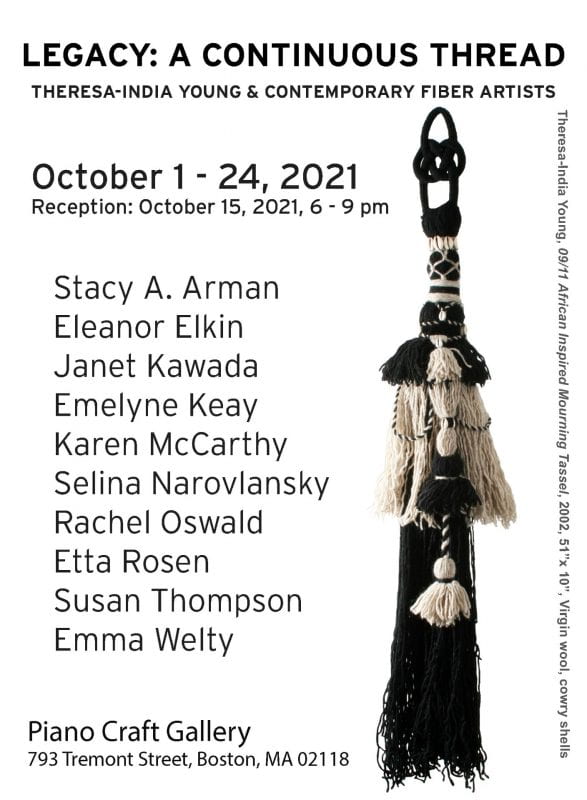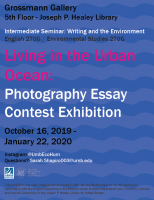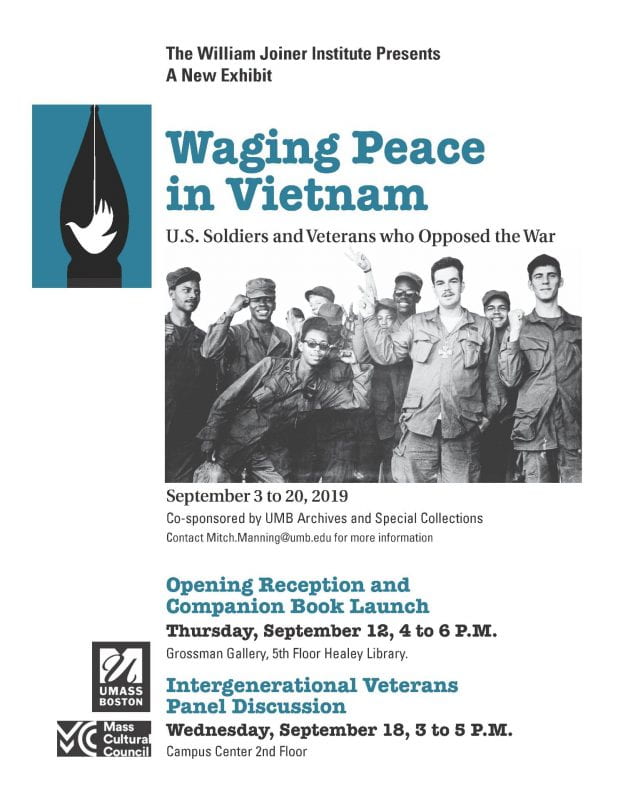Connecting Ties: A Transatlantic Friendship and the Northern Ireland Peace Process, an exhibition opening next week in the Grossmann Gallery on the fifth floor of the Healey Library, illustrates through textile language the human dimension to the relationship between the United States, Ireland, and the Northern Ireland peace process.
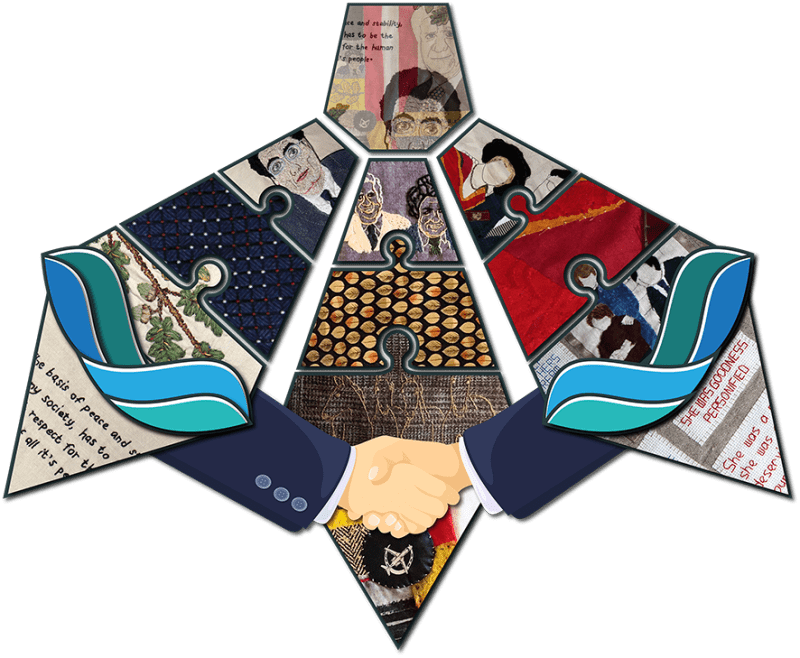
The exhibition is co-curated by Conflict Textiles, a unique transnational collection of textiles focused on conflict and human rights abuses, in partnership with John Hume & Thomas P. O’Neill Chair in Peace, INCORE, Ulster University, and the Joseph P. Healey Library at the University of Massachusetts Boston. It will be on view from November 17, 2023 through May 2024. Prior to the exhibition opening, the Tip O’Neill textile will be unveiled at the Golden Bridges 2023: Conference Luncheon, where John Hume, Peacemaker and Pat Hume will also be displayed.
A reception with refreshments will be held in the Grossmann Gallery on Friday, November 17, 2023, from 4:30 pm – 6:30 pm, during which the exhibition will be officially opened by Dr. Tom O’Neill. RSVP at the following link to the invitation: Official launch of the Conflict Textiles Exhibition (Boston) Tickets, Fri 17 Nov 2023 at 4:30 | Eventbrite.
The Northern Ireland Conflict (“The Troubles,” 1969-1994), which focused on the division of the island of Ireland, left more than 3,600 people dead, many more injured, and impacted all sectors of society. From the mid-1970s, key individuals from the United States, including Speaker of the United States House of Representatives and Massachusetts Congressman Thomas “Tip” O’Neill, were involved in discussions and negotiations during the peace process, culminating in the Good Friday Agreement signed in April 1998. In supporting peace in Northern Ireland, Tip O’Neill worked closely with John Hume, the Nobel Peace Prize winner from Northern Ireland. This unique friendship and the contribution of John Hume’s wife Pat are illustrated in the exhibition.
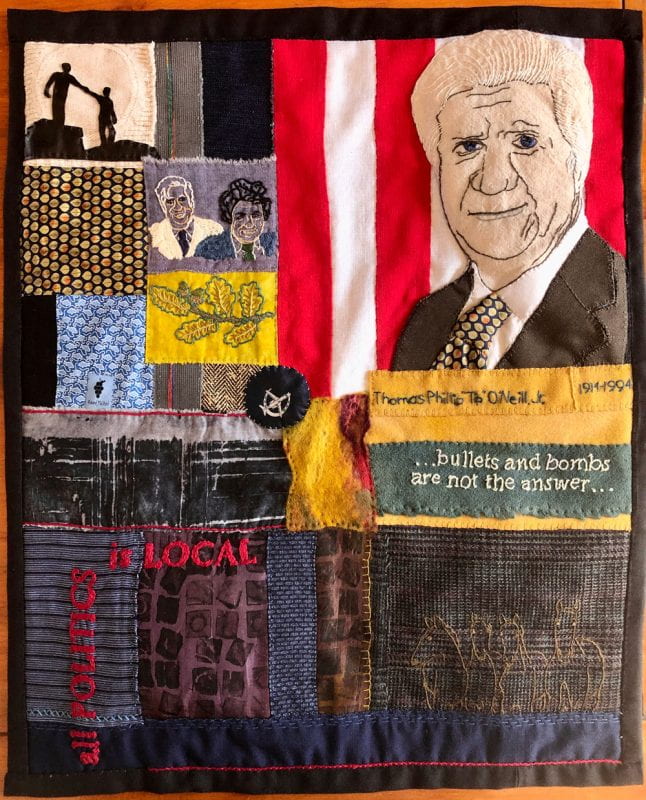
The exhibition showcases three specially commissioned textiles highlighting the interconnections and work of these essential people in the peace process. The three textiles entitled Tip O’Neill, Pat Hume, and John Hume, Peacemaker are accompanied by several Northern Ireland textiles depicting the conflict and search for peace in the late twentieth century. Four of these pieces, on loan from Causeway Coast and Glens Borough Council Museum Collection, were created in workshops in Northern Ireland in 2012 and 2013, during which two Northern Ireland communities explored the legacy of the conflict through textile language.
These textiles and many others on display draw their inspiration from early Chilean arpilleras, which are appliquéd picture textiles, handsewn from scraps of fabric onto hessian or burlap. Three Chilean arpilleras from the 1980s and 1990s narrate ordinary peoples’ experiences of the oppressive seventeen-year-long Pinochet dictatorship, which seized power in September 1973. An arpillera from neighboring Argentina
articulates the human rights violations of the Videla regime (1976-1983) and the enduring, courageous protests by the Abuelas (Grandmothers) de Plaza de Mayo.
Selected highlights from the Disappeared Children in Argentina: Rita Arditti’s Interviews with the Grandmothers of Plaza de Mayo collection and the Padraig O’Malley papers held at UMass Boston are also featured.
The Grossmann Gallery is open during Healey Library hours.
University Archives and Special Collections in the Joseph P. Healey Library at UMass Boston collects materials related to the university’s history, as well as materials that reflect the institution’s urban mission and strong support of community service, notably in collections of records of urban planning, social welfare, social action, alternative movements, community organizations, and local history related to neighboring communities.
University Archives and Special Collections welcomes inquiries from individuals, organizations, and businesses interested in donating materials of an archival nature that that fit within our collecting policy. These include manuscripts, documents, organizational archives, collections of photographs, unique publications, and audio and video media. For more information about donating to University Archives and Special Collections, click here or email library.archives@umb.edu.
